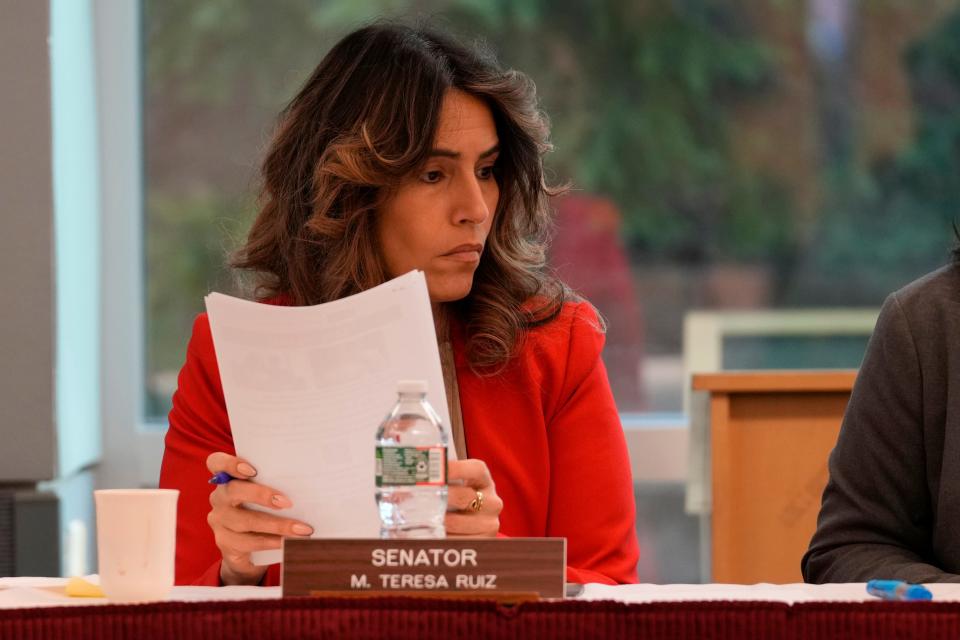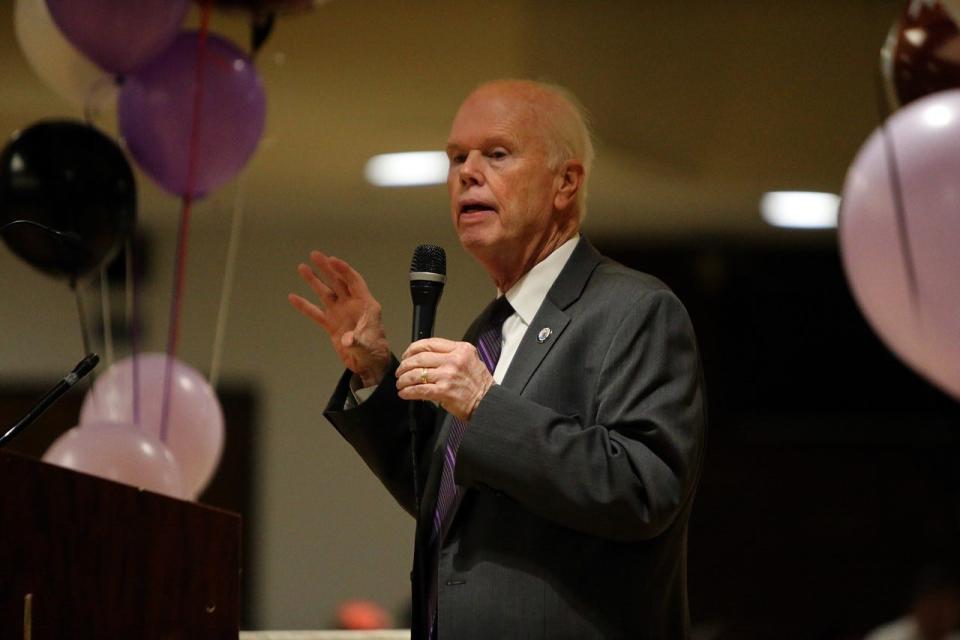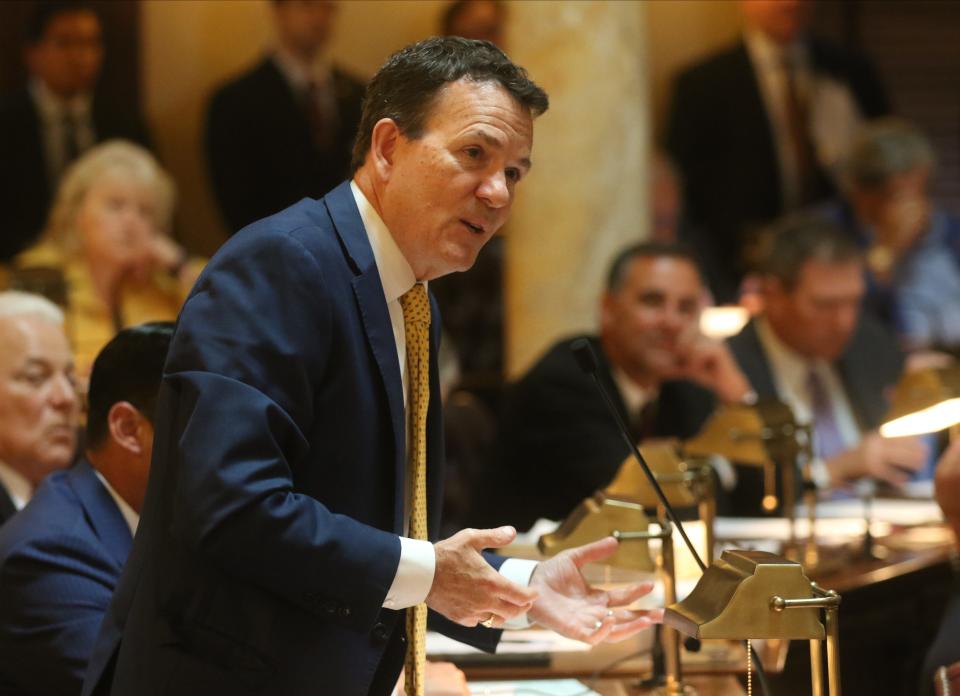Weigh in on NJ Transit 15% fare hike, looming deficits, corporate tax at public hearings
- Oops!Something went wrong.Please try again later.
There's plenty to weigh ahead of NJ Transit’s public hearings this week on the agency's plan to raise fares by 15% on July 1 — the agency's first fare hikes in nine years — followed by annual, indefinite increases of 3%.
The chief issue — and the reason for the 10 statutorily required hearings — is the fare increase plan. The other is Gov. Phil Murphy's state budget proposal to create a corporate transit tax that would impose a 2.5% charge on companies that earn more than $10 million a year — money that would address NJ Transit's looming budget deficits.
The fare hike and the corporate tax are both solutions being debated this budget season for the same reasons: to help address NJ Transit’s historic budget deficits predicted for the next two fiscal years and improve the stability of funding for one of the largest statewide public transportation agencies in the country.
The agency is facing a more than $100 million budget deficit this coming fiscal year and a nearly $1 billion shortfall the year after, shortfalls mass transit agencies around the country are experiencing due to lower ridership post-COVID as commuter trends and work-from-home patterns have changed.
But there is one tricky logistical issue: timing.
Story continues below photo gallery.
The NJ Transit board is expected to vote in April on both the 15% fare hike starting July 1 and 3% indefinite fare increases every year after that. But state budget negotiations between the executive and legislative branches — where the corporate transit fee will likely be a hotly debated issue — often drag on in secret fashion until July 1, the start of the new fiscal year.
The question becomes: Should NJ Transit’s board vote on a fare increase proposal without knowing whether there will even be a corporate transit fee, let alone details of how it will work, when it will go into effect and how much money is expected to go to the transportation agency?
Timing is everything
State Sen. Raj Mukherji, a Democrat from Hudson County, said he is concerned about the timing disconnect.
The corporate transit tax and "much-needed dedicated funding is very welcome, and I think the concerns about the fare hikes could be mitigated if the timing was better aligned with the budget process and commuters knew there was light at the end of the tunnel,” Mukherji said.
NJ Transit's board is required by law to submit its proposed budget to the Legislature and various committees by April 1. The finalized budget is not approved by the board until after the state budget process concludes in June.
Asked whether there is any flexibility or consideration being given to aligning the board vote with the state budget process, NJ Transit board Chair and DOT Commissioner Francis O'Connor said in a statement that all of the feedback from the public comment period will be reviewed before the board makes any final decisions.
Last year, NJ Transit's board approved its proposed budget April 19, also after the state-mandated April 1 deadline. Why the agency did that and whether the agency did so with permission or faced any consequences were questions posed to NJ Transit on Monday and were not immediately answered.
'Everything is on the table, but it has to be fair'
For several legislators, the possibility of fare increases cannot be talked about without discussing the future of a corporate transit tax.
Sen. Teresa Ruiz, D-Newark, said the corporate transit tax “makes 100% sense to me.” She “wholeheartedly" supports the concept of identifying a recurring revenue source "to sustain a transportation system that gets people to and from work.”

But before any decisions are made, Ruiz said, she wants to understand more about how the corporate transit tax would work and how much revenue it is expected to generate for NJ Transit, in case it could prevent fare hikes.
“We do have to have long-term discussions about protecting the commuter, because there was just a proposed [fare] increase and we must be sure that [NJ Transit] is right-sizing itself and doing what it needs to do to tighten its belts,” Ruiz said. “Everything is on the table, but it has to be fair.”
Sen. Patrick Diegnan, D-Middlesex, said the corporate transit tax is “the answer” for NJ Transit’s budget problems. “Let’s admit it, transportation is one of the reasons the economy is moving in New Jersey,” Diegnan said. But he is concerned about the fare hike proposal.

“I’m not unrealistic enough to know that there’s going to be no fare increase, but 15% is too high,” he said, adding that the 3% annual increase should be revised, too. The governor's budget announcement last week “was the first day of coming up with a solution, and let’s go from there.”
O'Connor said the agency is addressing its budget problems with a three-pronged approach.
"The fare adjustment proposal solves the short-term operating budget shortfall of $106.6 million in FY25; the governor's proposed budget, which includes the Corporate Transit Fee, along with the smaller annual increases in the fare adjustment proposal, will support the long-term funding needs beginning with the significant fiscal cliff the agency is facing in FY26," O'Connor said in a statement.
"The agency is working to identify further efficiencies, savings and revenue enhancements — in addition to the $44 million in savings and $52 million in revenue they identified for FY25," he said.
Republicans have repeated that new taxes and fare increases continue to hurt families and make the state less attractive for businesses, when instead there should be larger budget reforms taking place to address deficits.
“We’re seeing now that the same issues we’ve faced for years — funding NJ Transit, funding our other transportation systems, funding our overall budget — and the administration is resorting back to the same old tax, fees and toll increase solutions that dug this hole this deep in the first place,” said state Sen. Declan O’Scanlon, R-Monmouth.

“At some point, tax, fee and toll increases really start to impact people’s lives — we’re long past that point in New Jersey," he said. "Because we aren’t willing to do some of these fundamental reforms, there’s no end in sight.”
Calls heighten for virtual, Jersey City public hearings
In the meantime, the commuting public can make their voices heard during public hearings set to take place March 4 through 8 in Cherry Hill, Atlantic City, Paterson, Hackensack, Trenton, Belmar, Woodbridge, Union, Secaucus and Newark.
Yet even those have become a point of frustration, with people urging and petitions circulating to advocate for a virtual participation option, which is currently offered at NJ Transit board and committee meetings.
Mukherji, the state senator from Hudson County, noted concerns about the lack of virtual participation and that there isn’t a hearing scheduled in Jersey City.
“Considering the business that NJT gets from the dense communities in Jersey City, it’s unconscionable that they would avoid the county seat and the state’s second-largest city in planning the public hearings," he said. "And I have expressed that to NJ Transit.”
Shanti Narra, a commuter from Middlesex County and a member of NJ Transit’s board, said she is concerned about the lack of a virtual participation option and mentioned she will have to miss the public hearing being held in her home county because it will occur during work hours.
“As to the virtual option, I certainly hear a lot of people’s concerns,” she said, adding that she brought this up to NJ Transit’s staff.
O'Connor, NJ Transit's board chair, did not respond to questions about whether any consideration is being given to holding a hearing in Jersey City or offering a virtual option.
This article originally appeared on NorthJersey.com: Public can weigh in this week on NJ Transit's 15% fare hike

